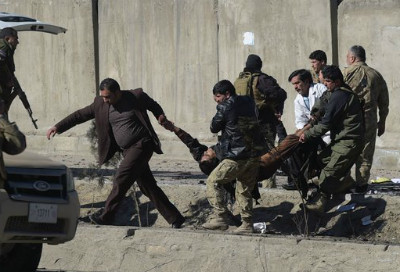On Wednesday, a US government report stated that Afghanistan’s security infrastructure must be stabilized to keep from becoming a sanctuary for terrorists, but noted that Afghan Security Forces are not yet equipped to secure the country without assistance.
The report by the Special Inspector General for Afghanistan (SIGAR) rendered an assessment of the country two years after NATO forces pulled out in 2014, leaving behind a small training and assisting mission.

Afghan personnel carried a victim of a bombing in Kabul on Feb. 1, 2016.(Photo: Shah Marai/AFP/Getty Images)
SIGAR serves as an oversight group for the spending of US reconstruction funds in Afghanistan, and their high-risk evaluation notes that Kabul only controls 63 percent of its territory despite some $70 billion spent to train, bolster and equip Afghan forces.
"The Afghan national defense and security force has not yet been capable of securing all of Afghanistan and has lost territory to the insurgency," the report reads. The document also observed that several areas in the country have become hotbeds for drug trafficking and corruption, with Inspector General John Sopko saying, "To combat the Taliban and other threats, the United States has provided more than $64 billion since 2002, including $3.45 billion in fiscal year 2016 alone, to support the Afghan National Army, the Afghan National Police, and the Afghan Air Force."
Afghan security forces are "generally capable and effective at protecting major population centers, preventing the Taliban from maintaining prolonged control of specific areas, and at responding to Taliban attacks," according to Defense Department reports cited by SIGAR.
Capturing a provincial capital was a key Taliban objective in 2016. Incidents like Tuesday’s suicide attack near parliament buildings in Kabul showed that militant groups in the country are capable carrying out large-scale attacks on urban centers. The coordinated attack killed 38 people and wounded many more, after a suicide bomber detonated himself in the Darul Aman area, while a car bomb exploded soon after.
Another Tuesday bombing at a provincial governor’s guest house in Kandahar killed five diplomats from the United Arab Emirates. Kandahar governor Hamayun Azizi and the UAE ambassador were among the wounded.
SIGAR did not place all the blame on the Afghan government, however, saying that Washington did not make a thorough evaluation of the landscape before intervening.
"While some aspects of reconstruction in Afghanistan have continued to improve over the past two years,” the report stated, “most of the issues highlighted in this report have not…the United States contributed significantly to the problems in Afghanistan by dumping too much money, too quickly, into too small an economy, with too little oversight."



